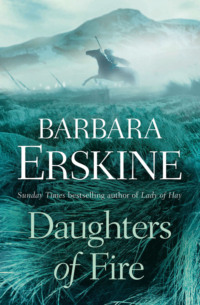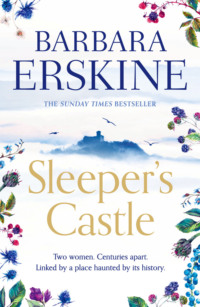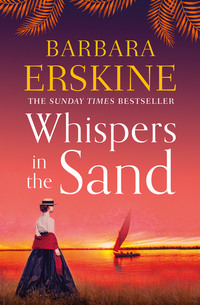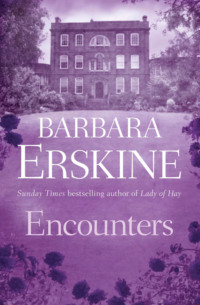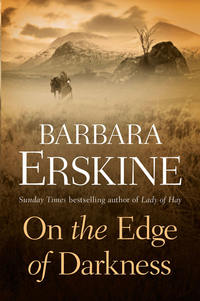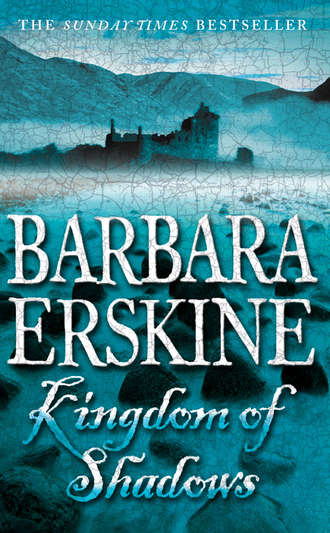
Полная версия
Kingdom of Shadows
It was not until they were sitting at their table downstairs at Gows and their food had arrived that James dropped his bombshell.
‘What do you think about the offer for Duncairn?’ he asked innocently as he picked up his fork.
‘The what?’ Paul stared at him.
‘Clare received an offer for Duncairn. Didn’t she tell you? She turned it down, of course. I gather they didn’t mention a figure –’
‘Who? Who wants to buy it?’
‘Ah well, that’s the interesting point. Clare didn’t know – the offer came through a third party, but I’ve done some nosing around amongst my pals.’ James stopped and put a forkful of fish into his mouth, chewing slowly, well aware that Paul was waiting.
‘And?’
‘And I gather there is some speculation about surveys they’ve been doing up that coastline. Word is one of the oil companies might have put in a pre-emptive bid just in case they decide to test drill. The bet is that the offer is from one of the big consortia, or, just possibly from an outfit called Sigma Exploration, a US-based company which is trying to get a larger foothold overseas. There’s been a lot of talk about them in the City lately. You must have heard of them. They’re trying to raise some big bucks.’
‘And you think some of it is to buy Duncairn?’ Paul’s eyes narrowed. ‘For God’s sake, Clare never mentioned it!’
‘She doesn’t know,’ James put in hastily. ‘Not about Sigma.’ He hesitated. ‘She’ll put up a hell of a fight for Duncairn, Paul –’
He stopped, astonished, as Paul laid down his knife and fork, his food untouched, and pushed back his chair. His face was white … ‘Fight,’ he said slowly. ‘She doesn’t even know the meaning of the word. If someone is offering big money for that heap of stones, and she opposes the sale, I’ll make her sorry she was born!’
Turning on his heel, he headed for the staircase.
4
Clare was out in the tiny suntrap of a garden at the back of the London house when Paul arrived. An open book had been discarded on the paving stones beside her chair as she lay, dressed in a low-necked cotton blouse and shorts, soaking up the afternoon sun.
For a moment she didn’t see him as he stood in the doorway watching her, then sensing his presence, she opened her eyes. He stepped out on to the terrace and stood looking down at her in silence.
Clare sat up, startled. ‘Paul? What is it? Did you forget something?’ That morning he had left before she was awake, and she had not heard him return the night before.
‘I’ve just had lunch with your brother.’
‘Oh?’ Clare felt her stomach tighten warningly. Deliberately she resisted the urge to scramble to her feet. She stared hard at the litter of crisp dead leaves nestling in the moss against the bricked border of the flower bed, and waited.
‘He tells me someone has offered to buy Duncairn.’ His voice was even.
‘That’s right.’ Clare tried to sound casual. ‘Crazy isn’t it? I expect they wanted to develop the hotel.’ She carefully avoided looking at him.
‘No doubt. May I ask how much they offered you?’
‘They didn’t mention a figure. They said if I were interested we could discuss a price, but as I have no intention of selling, there is nothing to discuss.’ She knew she was speaking too quickly.
‘And you weren’t even interested enough to find out how much they were considering offering you?’ His tone had a mocking, dangerous ring.
‘No.’ She stood up abruptly, her shoulders hunched, and took a few steps away from him, studying a bruised rosebud with exaggerated care.
‘What if I told you that it was worth a fortune to the right person,’ he said quietly.
‘It wouldn’t make any difference.’ She turned to face him. ‘I suppose James told you that he thinks they want it for an oil terminal or something. Well, even if they do, I don’t care. I’m not selling.’
‘Not a terminal, Clare. They think there is oil there.’
She stared at him. ‘I don’t believe you!’
‘It’s true. Whether you believe it or not, and whether there is really oil there or not is immaterial. The fact is, one of the oil companies believes there may be, and they want to acquire the land. Under different circumstances, I might have agreed with you and said keep the land, although rents and revenues are unlikely to be worth much, but we need the capital, and with the oil industry in such turmoil, the sensible thing is to go for money in the hand. Now. If this company wants to invest in a speculative deal, then you should take their offer. It will be a big one.’ He was watching her intently, his voice still carefully even. ‘They might change their mind later.’
‘No.’ Clare clenched her fists. ‘Don’t you see? I don’t want to sell.’
Paul sighed. ‘I appreciate your sentimental attachment to the place, but you must overcome it. People have to move with the times.’
‘No. No they don’t. Aunt Margaret left Duncairn to me. She meant me to have it for ever.’ She was trying to breathe calmly.
‘And pass it on to your children?’ Paul’s voice was acid.
Clare froze. ‘Mine or James’s,’ she whispered at last.
Paul sat down on the wooden bench near her. Behind him the mellow London stock bricks of the wall radiated a gentle heat from the sun. He took a deep breath, determined to seem calm. ‘Clare,’ he said with exaggerated patience, ‘I do appreciate your feelings, darling, but they are totally irrational. When the price is right one must always sell.’
‘And everything has a price, of course.’ She sounded very bitter. ‘So, tell me, Paul. What is the price for Duncairn? Were you thinking of driving them up? Holding an auction perhaps in a marquee in the castle grounds? What is it to me, after all? Just some scrubby moorland, some inaccessible cliffs, the feus of a fishing village, a ruin and a hotel that makes no money! You’re right. I should sell it at once! I can’t think why I should have delayed.’ She flung herself towards the door. Then she stopped and faced him again. ‘Money! That’s all you think about! For God’s sake, why do we need any more capital? Haven’t we got enough? We’ve so much more than most people have.’ Her voice had risen passionately.
‘No, we haven’t got enough. As I told you before, Clare, one cannot have enough money,’ he replied coldly. ‘And as your aunt failed to leave you any at all to administer the estate, and as you seem convinced she had your welfare at heart, I can only assume that she had some idea of its worth. It may be that she did after all leave her property divided equally between you and James. And if that was the case, she expected you to sell.’
‘She did not.’ Clare stared down at him. ‘You know perfectly well she did no such thing. I don’t understand you any more, Paul. If we needed the money, this would make sense, perhaps. But we don’t.’ She pushed her hair back from her face. ‘Do we?’
For a moment he hesitated, then he shook his head. ‘I need all the money I can get, Clare. For investment.’ He gave a hard, humourless smile. ‘And I intend to get it. And I am not going to let you stand in my way.’
There was a moment’s stunned silence as Clare stared at him. ‘What do you mean?’ she managed to ask at last.
‘I mean, I intend to see to it that you accept that offer. You’ll have no children, Clare, to pass on some stupid old woman’s sentimental vision of a family seat to. The Gordon connection with that land would die with you anyway, because I’m damned if you’re leaving it to your brother. He’s got enough as it is.’
‘I could still have children, Paul –’ In her confusion at his sudden rage Clare seized on her one bit of hope. ‘You said there is nothing wrong with me –’
‘No! Accept the fact. You will never have children. John Stanford told me so, Clare. We didn’t want to hurt you, we didn’t want you to blame yourself, so we agreed to say nothing to you. But it’s you. You who can never have a baby!’ He stood up, his face taut, his bitterness, anger and impotence focussing at last on her, battering her, determined to hurt her as he had been hurt. ‘Inheritance means nothing when the line is barren, you might as well face it. Do you think if you did decide to leave Duncairn to James that he would keep it for one single minute? Of course he wouldn’t. He would sell.’
‘Paul –’
‘No, Clare. No more crazy excuses. I want you to give me that letter. I’ll contact the solicitor –’
‘I burnt it.’ Quite suddenly she was completely calm. She looked at him coldly. ‘I have no intention of selling, Paul, or of letting you do it for me. The land is mine. And it will remain so.’
Their eyes locked. For a moment she thought he was going to hit her. Then, abruptly, he pushed past her and went into the house. A few minutes later she heard the front door bang.
For a long time she sat quite still on the bench, her mind a blank. The October sun had slipped behind the rustling, paper-dry leaves of the plane tree in the garden behind theirs, throwing cold, flecked shadows over the paving. She shivered violently.
Barren. The most desolate word in the English language. No pregnancy; no baby; no sons; no daughters. Just a useless empty woman, hated by her husband. The look in his eyes had been more eloquent than any of the words he had thrown at her. He disliked her and he despised her. The change in him which had started the day Aunt Margaret’s will was read was now complete. The Paul she knew, the Paul she had married, had disappeared. His charm, his sense of humour, his carefree extravagance – all had gone. Had he never loved her then, at all? Was the acquisition of money going to take the place of the family they would never have? She stood up and blindly she turned and ran into the house. Picking up the phone with a shaking hand, she began to dial.
‘I’m sorry, Mrs Royland, Dr Stanford is on his rounds at the moment. Can I get him to ring you when he comes in?’ The polite voice was impersonal.
Clare closed her eyes. ‘No. No thank you. Don’t worry him. It wasn’t important.’ Slowly she put down the receiver. For a long time she sat staring into space, then at last she stood up. Walking slowly upstairs she went into her bedroom and drew the curtains.
Her legs crossed, her hands resting loosely on her knees, she tried to force herself to breathe steadily. She could hear her heart pounding in her chest, feel the throbbing of her nerves, like electric shocks in her stomach. Calm. She must be completely calm before she lit the candle.
But it was no good. Slowly she pushed her body into a series of yoga movements: the cobra, the swan, the shoulder stand, the stork. But her mind was still racing, her muscles contorted. She could find none of the usual comfort in the asanas. Lying down flat on the floor she tried to relax, bit by bit, starting with her feet as she had been taught, but that was no use either. Exasperated, she gave up. What was the point of trying relaxation methods now? She never would conceive. There would be no baby. She was barren.
She paced up and down the floor a couple of times gnawing her thumbnail, then she reached for the phone again and dialled the Cambridge number.
‘Zak, I’m sorry to ring you, but you did say –’
‘Sure I did, Clare. What is it? You sound upset.’
At his desk at the open window overlooking the river, Zak de Sallis leaned back in his chair and threw down his pen. He was a tall, rangy man in his early thirties, his long brown hair caught back at the nape of his neck with an elastic band. His denim shirt and jeans, though frayed, were immaculately washed and ironed. Behind him the young man who had been lounging at the table stood up. He came silently across the room and stood behind Zak, his hand resting gently on Zak’s shoulder.
‘The doctor’s results have come through.’ Clare’s voice was loud in the room. ‘It is me, Zak. It is my fault. I’m the one who can’t have children. I’m barren. And there’s nothing any one can do. No amount of yoga is going to help me.’
‘Hey, steady, Clare. Calm down.’ Zak felt the hand lifted and knew that Kenny was frowning. He hunched his shoulders in momentary irritation. ‘Listen. Did the doctor say there was nothing to be done? That doesn’t sound likely to me. There are always things they can do.’
‘No. He told Paul I would never have children – there is no point in me going on with all this, Zak –’ It was a plea for help.
‘Oh, but there is, Clare.’ His lean figure relaxed and he tilted the chair back, balancing himself with one finger under the rim of the desk. ‘All the more reason. You are a very together person, Clare. You can do it.’ The soft Californian accent was rhythmical and calm. ‘You have enormous inner resources, Clare. I don’t have to tell you that.’
‘I don’t know that I have, Zak. I don’t know if I can cope with all this. Please. I must see you –’
‘You don’t need me, Clare.’ Zak glanced at Kenny, who was staring out of the window, his hands in his pockets. ‘You have the techniques now, and I know you can use them.’
‘But I’m not doing it right. I’ve tried and tried this afternoon, and I can’t do any yoga. I can’t meditate. I can’t even relax on the floor. I’m so wound up I feel I might snap at any moment –’
‘So. I want you to lie down on the floor. Do it now. Take the phone down there with you. Now, close your eyes.’ Zak was staring at the water. A punt with three young men in straw boaters was drifting down the centre of the river. ‘Now, I want you to picture somewhere special. Somewhere you love very much. Somewhere you feel secure.’ His voice was low and caressing.
‘It’s not going to work!’ There was real distress in her voice. ‘Oh, Zak! That was the one exercise I could do – the one I really enjoyed. I can’t even do that one!’ He could hear her panic; her sense of bereavement.
‘Well, the exercise you need is the one that works for you. So, we have to find out why it’s not working now, and start you off again. One of them will work, Clare.’ Suddenly he relented. ‘Look, where are you? I have to go to London tomorrow for a few days – if you can meet me there, maybe?’
‘Tomorrow?’ Clare hesitated. ‘I’m supposed to go home tomorrow. No, I’ll be here, Zak. I can’t face driving home with Paul tonight anyway, not after what has happened between us. Come here, to the house. I’ll be alone.’
‘OK, Clare. I’ll see you about three. And meanwhile keep relaxed, and keep practising the technique you find you’re comfortable with. It’ll work. Don’t try and force it. Just take it nice and slow and steady.’
Putting the receiver down he took a deep breath. ‘Don’t say it, Kenny,’ he said through clenched teeth. ‘Just don’t say it!’
Thoughtfully Clare looked down at the phone. She took the receiver off again and laid it gently on the table, listening for a moment to its quiet purr, then she ran downstairs to the front door. She locked it from the inside and set the chain, then slowly she walked upstairs once more. Zak’s calm voice had reassured her, had stilled the urgent jangling of her nerves. She would try again, as he suggested, and if it didn’t work at once, she would go on trying. There was no hurry. She had all evening. But somehow she had to find a way of getting back into Isobel’s world. There she could forget her own.
She lit the candle and stood looking down at it for a while, breathing slowly and rhythmically, then slowly she raised her arms. She closed her eyes and sank down to the floor. ‘Be there,’ she murmured out loud as she began to build again her laborious picture of the empty moors. ‘Please, be there for me …’
Isobel was on horseback, a bundle of clothes tied behind her on the wooden saddle, a cloak around her shoulders. A heavy fur-lined hood bounced behind her on her back and her hair was loose, streaming in the wind as she bumped up and down to her horse’s trot. She was alone.
She glanced behind her apprehensively, but the castle, silhouetted blackly against the blaze of the sunrise, was quiet. She had not been missed yet. Her heart gave a little lurch of excitement as she kicked the animal into a canter.
It was a year since Robert had left Duncairn and still she was unmarried. Martinmas had come and gone and Lord Buchan was too busy to arrange his marriage. He was constantly absent from the castle. One of the most influential men in the land, he was helping to direct the nation’s affairs, helping to balance the delicate political manoeuvres needed to keep Scotland an independent nation, free from English domination.
Having been asked to choose Scotland’s king from amongst the several claimants to the throne, after the direct royal line had failed with the death of Scotland’s little Queen Margaret far away in Norway, seven years before, Edward of England was not inclined to retire now from Scottish politics. His aim was to be overlord of Scotland if not king himself. The nation was in deadly danger. In March Berwick was captured and sacked and then the Scots had been defeated at Dunbar. Lord Buchan had not returned to his northern lands. Isobel, with everyone in the Countess of Buchan’s household, heard the news from the south and waited anxiously to see what would happen next, but her anxiety had a very personal twist to it. She did not want the Earl of Buchan to come back at all, unless, perhaps, he had had second thoughts and still thought his betrothed too young for marriage.
Nothing was said and Isobel prayed that the affair was forgotten. Then to her horror she found that it had merely been postponed while lawyers wrangled. Once again, she now knew, the date for the wedding had been set. So now she was having to carry out her plan.
Robert’s departure the year before had left Isobel very thoughtful. If he would not help her, no one would. She was alone. Alone in every sense but the true one, for not for a moment was she allowed out of sight of one of Lady Buchan’s attendants; on every side there were eyes watching her.
They could watch, but they couldn’t read her thoughts. Her vague childish optimism that the earl would forget about her was gone, so every waking second of her day was filled with plans of escape. She was cautious now, and outwardly docile, but inwardly she was defiant. She would not marry the Earl of Buchan.
She still hugged the thought of Robert to her secretly. His words had shaken her but, unknowingly, he had offered her a challenge. It was one she could not resist, and the reward for success was freedom. He was married now to another and he could never marry her, but he loved her. He had kissed her, and that kiss, she knew instinctively, had sealed a bond between them which had to be redeemed.
And to redeem it she had to leave Duncairn.
She did not doubt she would succeed; there was no possibility of failure. Carefully she laid her plans. Calmly practical she had rejected the romantic notion of climbing the castle walls. She had to go out through the gates, but invisibly, covering her tracks, so that no one would miss her and no one see her go. That meant at night.
The horses had been easy. She bribed Hugh, the handsome son of the farrier, to take one of Lady Buchan’s palfreys from the stables under the west wall and leave it overnight in the stall next to the forge. Reluctantly she decided against her own showy spirited grey pony, and selected instead a sturdy bay, a horse which would excite no attention on the road. Hugh knew what he had to do.
The bundle of clothes was easy too. She gathered them together over two days, stuffing each garment down behind a coffer in a corner of the dark sleeping chamber. It was the actual leaving of the curtained bed she shared with Mairi and Alice, one of Lady Buchan’s grand-daughters, which would be very hard.
She tried getting up before dawn to see what would happen. Grumpily Mairi turned her head on the pillows. ‘Where are you going, my lady?’ The woman’s eyes were still puffy with sleep.
‘Where do you think!’ Isobel slid out of the high bed.
In the privy she waited, counting slowly to see if Mairi would get up to see where she was or go back to sleep.
Mairi got up.
The second idea was more daring. She announced she had decided to go to keep a dawn vigil in the chapel to pray for the soul of her dead father. Grumbling furiously Mairi accompanied her there too and Isobel was forced to kneel on the cold stone for an hour, her eyes fixed on the statue of the Virgin before she would admit that she could stand it no longer and creep back to the warmth of the bed.
In the end the solution had presented itself. Mairi was so tired after her disturbed nights that she nodded off once or twice in the course of the day. Isobel noticed, and waited, and managed to whisper to Hugh.
That night she was deliberately restless, kicking her companions, tossing and turning, determined to keep them awake as long as possible so their exhaustion would make them sleep through her exit from the bed, though, she had to acknowledge, she could not have kept still if she had tried. Keyed up beyond endurance as she was with the thought that Hugh would be waiting at dawn, she was terrified that she would fall asleep herself and miss her assignation with him.
As the first lark soared upwards into the black sky Isobel lay completely still at last and held her breath. Beside her Mairi groaned and, punching the soft pillows, turned on her side. Within a few minutes her breathing had steadied and she was deeply asleep.
On the other side of her Alice muttered incoherently and let out a gentle snore. Isobel breathed a little prayer and wriggling towards the foot of the bed pushed her way out between the heavy curtains.
The spiral stair outside the door was pitch dark, the light in the sconce long since burned out. Holding her breath she listened; then she pulled her kirtle on over her head and wrapped herself up in her cloak. Barefoot she began to feel her way down the steep stairs, her hand pressed against the cold curving wall. In the silence of the pre-dawn she could hear everywhere the sigh and shift of the sea below the castle walls. It was almost high tide.
The great hall was full of sleeping figures, men lying on the rushes, wrapped in cloaks or plaids; the air was fetid. Wrinkling her nose she crept along the wall towards the door and using every ounce of strength to lift the latch and pull it open she slipped through. Beside it the door ward, an empty ale tankard beside him on the floor, sprawled against the wall. He never heard the latch lift, nor saw the slim dark figure slip out of sight amongst the shadows.
The cold morning air was sweet and intoxicating. Waiting only to pull on her shoes and take a firmer grip on her bundle, Isobel ran down into the outer bailey, praying Hugh had remembered.
He was waiting at the postern with the horse, the keys in his hand. When she had gone he would relock it, slip the keys back into the gatehouse, and crawl back to his pallet at his father’s side.
Isobel was exultant. She had not dreamed it would be so easy. Staring up into the brilliant blue of the sky she felt her heart soar up with the lark. She would show Lady Buchan and her son! And Robert! Other women might meekly marry and submit to their fate, but not she! She felt the wind lift her hair and, dropping the reins, she flung out her arms towards the sky. She was free!
She rode all day without seeing anyone, carefully avoiding the wider tracks, keeping to the deer paths through the heather, always alert for the movement of horses or the alarm calls of the buzzards which would tell her she was not alone. Two days’ ride, she had heard, that was all; two days with her back to the rising sun and her nose to the land where it sets, then she would reach the territory of the Gordons, the sworn enemies of Lord Buchan.
As night came near she grew less certain. She was desperately hungry, and she was cold. A heavy dew was falling as she stopped at last in a small glen with a burn running through it. It seemed a safe enough place, with shelter and grazing, but as the shadows lengthened and the soft darkness deepened around her, she felt for the first time a shiver of fear. Tethering the horse, she lifted down the heavy saddle with difficulty and, wrapping herself in her cloak, she settled herself to sleep.




